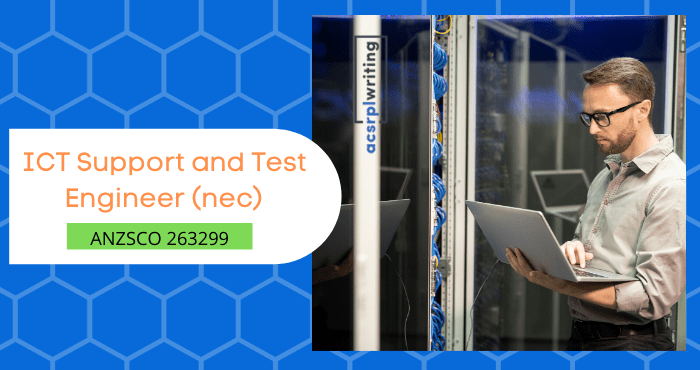ANZSCO 263299 – ICT Support and Test Engineer (nec)

ANZSCO 263299– ICT Support and Test Engineers (nec)
Description
ICT Support and Test Engineers (nec) develop procedures and strategies to support, create, maintain and manage technical quality assurance processes and guidelines and systems infrastructure, investigate, analyze and resolve system problems and performance issues, and test the behavior, functionality and integrity of systems. This occupation group covers ICT Support and Test Engineers not elsewhere classified.
Skill level: 1
Specializations
- Usability Architect
Skills Assessment Authority
- ACS (Australian Computer Society)
Visa Provision
ICT Support and Test Engineers (nec) is currently NOT on the Medium and Long term Strategic Skills List (MLTSSL) or the Short-term Skilled Occupation List (STSOL), so it is not possible to apply for an Australian visa under the General Skilled Migration (GSM) Program.
As no pathways exist for this occupation under any Australian skilled visas, you may wish to consider alternative routes of travel to Australia. If you are aged under 31 it is likely you are eligible for a Working Holiday Visa to Australia which will allow you to live and work in Australia for up to two years.
Alternatively, if your partner or spouse has experience or is employed in one of the applications currently listed on the MLTSSL or STSOL, you may wish to consider using them as the main applicant.
Unit Group: 2632 ICT Support and Test Engineers
Description
The job of ICT Support and Test Engineers (nec) is to develop procedures and strategies to support, create, maintain and manage technical quality assurance processes and guidelines and systems infrastructure, investigate, analyze and resolve system problems and performance issues, and test the behavior, functionality and integrity of systems.
Tasks
- scheduling and conducting quality audit inspections, and analyzing and reviewing systems, data and documentation
- identifying variations and potential high risk areas in securing adherence to standards and procedures
- recommending corrective action plans and improvements in the resolution of non-compliance with standards detected through monitoring and auditing of processes and procedures
- communicating, educating and liaising with users and management to ensure awareness and adherence to standards, procedures and quality control issues and activities
- assisting in troubleshooting, diagnosing, testing and resolving system problems and issues
- developing, conducting and providing technical guidance and training in application software and operational procedures
- analyzing, evaluating and diagnosing technical problems and issues such as installation, maintenance, repair, upgrade and configuration and troubleshooting of desktops, software, hardware, printers, Internet, email, databases, operating systems and security systems
- testing, identifying and diagnosing functionality errors and faults in systems, and programming code within established testing protocols, guidelines and quality standards to ensure systems perform to specification
- performing organizational systems architecture reviews and assessments, and recommending current and future hardware and software strategies and directions
- creating and reviewing technical documentation such as procedural, instructional and operational guides and manuals, technical reports and specifications and maintenance inventory systems
Skill Level
Most occupations in this unit group have a level of skill commensurate with a bachelor degree or higher qualification. At least five years of relevant experience and/or relevant vendor certification may substitute for the formal qualification. In some instances relevant experience and/or on-the-job training may be required in addition to the formal qualification (ANZSCO Skill Level 1).
Occupations in this Group
- 263211 ICT Quality Assurance Engineer
- 263212 ICT Support Engineer
- 263213 ICT Systems Test Engineer
- 263299 ICT Support and Test Engineers (nec)
Note: Whilst a similar occupation may appear in the same network analyst group if not listed in either the STSOL or MLTSSL the ANZSCO description should be used for reference purposes only.
English Requirement
- IELTS result with a minimum score of 6 (L, R, W), 7 in speaking and 7 overall;
- OET result with a minimum grade B in all sections;
- TOEFL iBT with a minimum score (L:12 R:13 W:21 S:23 overall L93);
- PTE Academic with a minimum score of 50 (L, R, W), 65 in speaking and 65 overall
Exceptions
- Australian Graduate exceptions apply in some states/territories
- Priority Skilled Lists may apply a specific requirement in some states/territories
- Countries exempt from submitting IELTS or OET include the UK; Canada; New Zealand; US; and Ireland
Where mandatory licensing or registration is required you must demonstrate a level of English either sufficient to meet licensing / registration or a minimum IELTS, or equivalent, whichever is higher.
Closely Related Core ICT Units
- Business Process Reengineering
- Computer Audit
- ICT Security
- Operating systems – (Unix, Linux, Xenix, Network OS)
- Quality management – (Quality Assurance, Software Quality)
- Risk Management
- Software Engineering
- Software validation – (Software Testing)
- Testing strategies and methods
Brief Description
The major roles contains control and coordinate the acquisition, plan, organize, direct, development, and maintenance.similarly the set of processes, architectures, and technologies that convert raw data into meaningful information that drives profitable business actions is known as business intelligence. ICT project manager also helps in enterprises architecture like building of it and taking care if any defect is found then to resolve. It also helps on bringing up together all the components sub systems into one system. It also serves as the backbone of an organizations operations. Use of various testing strategies according to system requirement. Software validation refers meeting the system requirement and specified business requirement.
Additional Closely Related ICT Units
- Computer forensics
- Computer Science
- Data communications – (WAN, LAN)
- Database design
- Database implementation
- Database Management Systems – (Relational Database, Object Oriented Database)
- Digital communication
- Information security – (Data security)
- Internet forensics
- Introduction to ICT – (Introduction to Computer Science, Computer Theory, Introduction to Business Computing, Computer Science I)
- Introduction to Information Systems
- Network architecture
- Programming – (C, C++, Objective C, Visual C, Basic, Visual Basic, Java, Assembler, Cobol, Pascal, PL/1, Fortran, PHP, Pearl, AS3, FoxPro, and similar)
- Software architecture
Brief Description
That law which is the applicable of investigation and analysis techniques to gather and preserve evidence from a particular computing device in a way that is suitable for presentation in a court of law.Network Security a set of rules and configurations designed to protect the integrity, confidentiality and accessibility of computer networks and data using both software and hardware technologies. The framework that contains network physical components and their functional organization and configure with its own principal and identification.And the communication protocols are also used. System test engineer also integrates the database design and takes the reponsibility of implementation also, in the management secton it contains relational database, object oriented databas.0+Graduated Students0+Awards & Recognition0+Professional Teachers0+Project Research





